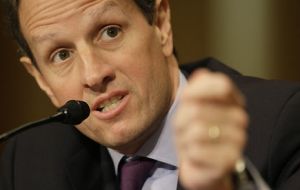MercoPress. South Atlantic News Agency
IMF calls on the US to tackle the deficit and help financial markets stability
 Treasury Secretary Timothy Geithner said US political system is more aware of the fiscal situation of the country
Treasury Secretary Timothy Geithner said US political system is more aware of the fiscal situation of the country There is an urgent need for the United States to tackle the deficit in the government's finances since the size of the exposure risks creating instability in the financial markets, according to the International Monetary Fund. However the IMF says the global economic recovery is gaining strength.
In developed economies the private sector is increasingly replacing government spending in driving that recovery, it added. This reduces the risks of a renewed recession as governments continue to curb their spending, the IMF Fiscal Monitor said.
However the report warned that developed economies still needed to watch levels of government debt.
“Among the advanced economies, the United States, in particular, needs to adopt measures that would allow it to meet its fiscal commitments,” the IMF warned.
“Market concerns about sustainability remain subdued in the United States, but a further delay of action could be fiscally costly, with deficit increases exacerbated by rising yields,” it said.
The US federal deficit currently stands at 1.4 trillion US dollars and is expected to reach 1.5 trillion USD in the current fiscal year.
Speaking at the World Economic Forum meeting in Davos in January US treasury secretary Timothy Geithner set out the US government's position on the federal deficit.
“There is a much greater recognition across the US political system that our fiscal position is unsustainable in the long-run” said Mr Geithner. He added “I know there are people who would like to make very deep cuts that would undermine the recovery.
”You got to make sure that you don't hurt the recovery and take so much risk that you damage the early expansion by shifting too prematurely to substantial restraints.
“We're not going to let that happen. There are some people who like to move... very quickly to do very deep cuts in spending, but it is not the responsible way to do it.”
The IMF twice-yearly assessment of the global economy also suggested that risks were building in emerging countries. The World Economic Outlook said some of them should allow their currencies to rise, which would help contain inflation by making imports cheaper.
There was a strong implication that China is one country that the IMF has in mind. A stronger and therefore less competitive currency is something that many other countries would like to see in China.
India is forecast to continue growing very strongly in the next two years, though not as rapidly as in 2010, when the IMF data shows it having grown even faster than China.




Top Comments
Disclaimer & comment rulesCommenting for this story is now closed.
If you have a Facebook account, become a fan and comment on our Facebook Page!